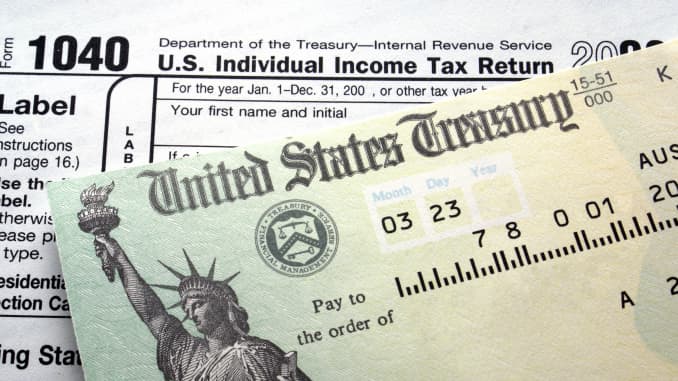- To date, 147 million second stimulus checks have been scheduled by the federal government.
- If you don’t get yours, you can claim the money when you file your tax return.
- That doesn’t necessarily mean you will get more money back from Uncle Sam.

If you don’t receive your second stimulus check in your bank account or the mail, the good news is you can claim the money when you file your tax return this spring.
But beware: That doesn’t necessarily mean you will automatically get the full $600 or other funds you feel are owed through the direct payments issued by the government.
The reason: The recovery rebate credit by which you can claim that money will be factored into your overall tax return, including liabilities.
So if you receive a credit for the $600 stimulus check, but owe $500, you will receive a payment of just $100.
“If you’re going to owe money, you’re still going to owe money,” said Janet Holtzblatt, senior fellow at the Urban-Brookings Tax Policy Center.
Admittedly, some people might prefer to receive a $600 check and have to pay $500 to the IRS separately.
Millions of second stimulus checks are on their way to Americans after Congress authorized the payments last month. That includes up to $600 per individual, $1,200 per married couple filing jointly and $600 per dependent under 17.
Individuals who earn up to $75,000 will qualify for full payments, as well as heads of households with up to $112,500 in income and married couples with up to $150,000. The payments will be gradually reduced and ultimately phased out for higher earners.
To date, 147 million second stimulus payments totaling $142 billion have been scheduled to go out. Of those payments, 113 million were made by direct deposit, while 34 million will be sent through either paper checks or debit cards.
The IRS is aiming to get all of those checks out the door by Jan. 15. If you don’t receive the money soon after, it’s best to claim it on the tax return you file this spring, said Garrett Watson, senior policy analyst at the Tax Foundation.
“While they processed them pretty quickly, we expect that there will probably be some portion of folks who may end up being in that situation,” Watson said.
It’s not just people who didn’t receive $600 second checks who stand to get more money. It’s also those who received no $1,200 check for which they were eligible.
Now, those individuals and families will be “topped up” for missing funds. Notably, those who received overpayments generally do not have to pay those sums back.
How to claim your recovery rebate credit

This year, the traditional Form 1040 and Form 1040-SR for seniors will let filers claim the recovery rebate on line 30. That will include a separate worksheet to help calculate the amount you are due.
The notices the government previously mailed regarding eligibility for the first or second payment can help you determine the amounts for which you can qualify. However, the section also applies to those who were overlooked and didn’t receive those notices.
“If you were expecting to get a payment that you didn’t, that worksheet help you determine if you should get one,” said Susan Allen, senior manager for tax practice and ethics at the American Institute of Certified Public Accountants.
Many people will probably opt to use either an automated tax preparer or accountant to help them through the process.
Those who feel they are missing stimulus funds may want to file as early as they can, Allen said.
Notably, if you receive a recovery rebate credit, that will reduce any other tax liability dollar for dollar, according to Watson.
You could owe funds if you under-withheld taxes from your paycheck or unemployment benefits, for example.
“The good news is it does reduce the amount that you otherwise would have owed,” Watson said. “From a net benefit perspective, you are held harmless, but it’s not as liquid as a direct check would have been earlier in the year.”
Because the recovery rebate credit will be based on 2020 adjusted gross income, it’s worth checking to see if your payment eligibility changes from the past stimulus payments, which were based on either 2018 or 2019 returns, particularly if your income went down last year.
Who could get bigger refunds this year

Despite the recovery rebate, tax refunds overall may not necessarily go up dramatically this year.
In economic downturns, certain factors tend to reduce refunds, often because people earn less and tend not to withhold taxes from unemployment benefits, Watson said.
In addition, the amount of credits for which people are eligible, such as the child tax credit or earned income tax credit, also tend to go down as people work less, he noted.
Stimulus checks will have the opposite effect for those who are eligible to claim those payments when they file. That “really will increase refunds on net on average for folks who are low or middle income during this filing period,” Watson said.
Because many people’s financial situations changed so dramatically in 2020, that can make it harder to guess how average refunds will shape up this tax-filing season.
“I think on net it ends up being probably slightly higher, though there’s interactions there with UI that make it hard to say definitively,” Watson said.
